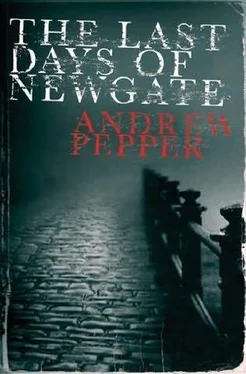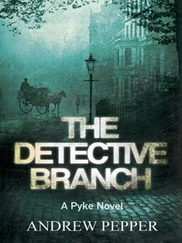Andrew Pepper - The Last Days of Newgate
Здесь есть возможность читать онлайн «Andrew Pepper - The Last Days of Newgate» весь текст электронной книги совершенно бесплатно (целиком полную версию без сокращений). В некоторых случаях можно слушать аудио, скачать через торрент в формате fb2 и присутствует краткое содержание. Жанр: Исторический детектив, на английском языке. Описание произведения, (предисловие) а так же отзывы посетителей доступны на портале библиотеки ЛибКат.
- Название:The Last Days of Newgate
- Автор:
- Жанр:
- Год:неизвестен
- ISBN:нет данных
- Рейтинг книги:4 / 5. Голосов: 1
-
Избранное:Добавить в избранное
- Отзывы:
-
Ваша оценка:
- 80
- 1
- 2
- 3
- 4
- 5
The Last Days of Newgate: краткое содержание, описание и аннотация
Предлагаем к чтению аннотацию, описание, краткое содержание или предисловие (зависит от того, что написал сам автор книги «The Last Days of Newgate»). Если вы не нашли необходимую информацию о книге — напишите в комментариях, мы постараемся отыскать её.
The Last Days of Newgate — читать онлайн бесплатно полную книгу (весь текст) целиком
Ниже представлен текст книги, разбитый по страницам. Система сохранения места последней прочитанной страницы, позволяет с удобством читать онлайн бесплатно книгу «The Last Days of Newgate», без необходимости каждый раз заново искать на чём Вы остановились. Поставьте закладку, и сможете в любой момент перейти на страницу, на которой закончили чтение.
Интервал:
Закладка:
With this thought in mind, his gaze fell upon the portly figure of Lord Edmonton, who had taken up a seat on the bench opposite the dock and was talking amiably to his companion. Ernest Augustus — duke of Cumberland, earl of Armagh and the King’s brother — was a tall man with a hideously scarred face, offset by a carefully manicured moustache and a pumpkin-shaped head. Though his wound had been honourably received during the Napoleonic wars, it transformed what would otherwise have been a merely overbearing face into something monstrous. He was slightly balding and prematurely grey, giving the impression that he was older than he perhaps was. The duke was dressed ostentatiously (and ridiculously in Pyke’s view) in the uniform of a Hanoverian general. Edmonton saw that Pyke was looking at them and ran his index finger across his neck, to simulate the cutting of his throat.
A few places along from him, Sir Richard Fox was engrossed in a conversation with Viscount Lowther, an acquaintance of Peel. Fox looked old and worn, and though he had come to witness the trial he could not bring himself to look across the room and meet Pyke’s stare. Pyke wondered what outcome Fox was hoping for, whether he wanted to see him walk free or not.
Pyke’s gaze shifted to the public gallery and he saw Emily Blackwood. She was wearing an ivory dress and shawl, her hair pinned up and held in place by her bonnet. She seemed frailer than he remembered. For a moment their eyes met, and she smiled and mouthed a silent ‘hello’. She seemed not to want to draw attention to herself. He wondered whether Edmonton knew that his daughter was present in the courtroom.
Pyke’s attention was wrested away from Emily by the wheezing figure of his uncle, who had managed to persuade one of the court officials that he had urgent business with Pyke.
‘Change of plan, I’m afraid,’ he said, catching his breath. ‘The Crown’s case will now be presented by William Gregson. I’ve heard he’s good.’ Godfrey noticed what Pyke was wearing and frowned. ‘What, in God’s name, are you wearing that dreadful outfit for?’
Pyke ignored the question. ‘Peel’s lawyer. He helped to draft the Metropolitan Police Bill. I met him about a month ago.’ It was depressing news but it confirmed what he already knew.
‘Well, in that respect at least, we have got our own ace.’ Godfrey looked around. ‘I wonder where Quince has got to. He’s cutting things a bit fine. Proceedings are due to start at any minute.’
‘I told him I no longer required his services,’ Pyke said, as though the matter was of no consequence. ‘I said I wouldn’t pay him for his time unless he agreed to relinquish his representation. That worked well enough.’
Godfrey stared at him, aghast. ‘You did what?’
‘It’s a common enough occurrence. Defence attorneys withdrawing at the last minute to take up more lucrative work elsewhere.’
‘Why? ’ Godfrey sounded angry as much as concerned. ‘Who on earth is going to represent you now?’
‘I don’t need representation.’
Godfrey looked flummoxed. ‘For God sake, boy, do you want them to hang you?’
Pyke didn’t answer him.
Once the recorder, Lord Chief Justice Marshall, had read out the indictment, he turned his attention to Pyke, who was standing across the courtroom from him in the dock, and asked how he wished to plead.
‘Not guilty,’ Pyke said, loud enough for the whole courtroom to hear him.
Under his horsehair wig, Marshall frowned. ‘I am led to believe that you are without legal representation. Is that correct?’
‘It is, Your Honour.’
Marshall nodded gravely. ‘I want to make it clear that this sorry state of affairs provides you with no legal grounds for arguing for a new trial at some later date.’
‘I understand, Your Honour.’
‘Very well. Let the trial begin.’
Once the jury was sworn in and two further judges had taken their place on the bench next to Marshall, beneath the sword of justice, the Crown’s barrister, William Gregson, started to outline the case against Pyke. Emphasising certain elements of the Crown’s case over others, he drew attention to the testimony they would hear from Maggie Smallman, the barmaid who worked at the accused’s ‘sordid’ gin palace: she would tell the court that Pyke had threatened to kill Lizzie Morgan, his mistress, on numerous occasions. He drew attention to a neighbour’s claim that he had heard the deceased call out to Pyke on the night she was murdered, begging for her life. He also told the court that Pyke’s flight from the murder scene was undoubtedly a sign of his guilt. He acknowledged that the Crown’s case relied on circumstantial evidence but pointed out that solid circumstantial evidence was often superior to eyewitness testimony. Pyke listened to his speech with interest but said nothing.
When Pyke offered no cross-examination of the first four prosecution witnesses, the recorder felt compelled to intervene. He asked Pyke whether he thought it aided his defence to allow the testimony of witnesses, even ones with questionable reputations and social standing, to go uncontested. He seemed puzzled. Pyke said he would try to play a more active role in the proceedings. Marshall replied it wasn’t a question of what he wanted; rather, Pyke’s liberty and indeed his life were being threatened by his indifference. Again, Pyke promised he would try to do better. Marshall shook his head, as though he were dealing with a simpleton.
So when the next witness, James Hardwick, was introduced and outlined his own area of expertise — phrenology, or the relationship between the shape and size of a skull and the mind it contained — Pyke decided to involve himself in the proceedings.
He agreed to allow his own cranium to be measured and scribbled a few notes while Hardwick explained that Pyke’s ‘enlarged organ’ revealed a propensity for ‘recklessness, combativeness, destructiveness, self-esteem and secretiveness’.
When Hardwick had finished, Marshall asked whether Pyke cared to cross-examine the witness, and was about to move on when Pyke said, ‘I do have one question, Your Honour.’
‘Oh?’ Marshall looked up at him, a little surprised. ‘Go on, then.’
Pyke turned to the witness box and said he was very interested in Hardwick’s claim about the relationship between ‘anomalies’ in the skull and ‘enlarged cranial lobes’ and an individual’s propensity for recklessness and aggression.
‘Am I correct in concluding that, according to your theory, such cranial features suggest a less developed mind?’
Hardwick nodded. ‘Suggest is perhaps too modest a word.’
‘Such features demonstrate a less developed mind, then.’
‘Indeed,’ Hardwick said, looking at Pyke warily. ‘This was the thesis of Gall and Spurzheim and I see no reason to question it.’
‘And this propensity for violence, even murder, demonstrated in one’s skull shape and size, takes no account, you say, of social standing or class?’
‘That is correct.’
Pyke smiled. ‘Then since good science, as you well know, is based on the principles of scrutiny and observation, perhaps we might test this hypothesis, taking as our example the most esteemed of all men gathered here in this courtroom.’
Hardwick looked around him nervously. ‘And who might that be, sir?’
‘Why, of course, the King’s much venerated brother, Ernest Augustus, duke of Cumberland and earl of Armagh.’
Hardwick stammered that such a request was both impertinent and counter-productive. Beads of sweat appeared on his brow. Attention in the courtroom shifted from the dock to the bench. The duke himself, who had been watching proceedings through a pocket telescope, did not seem to welcome the interest. He whispered something angrily in Edmonton’s ear.
Читать дальшеИнтервал:
Закладка:
Похожие книги на «The Last Days of Newgate»
Представляем Вашему вниманию похожие книги на «The Last Days of Newgate» списком для выбора. Мы отобрали схожую по названию и смыслу литературу в надежде предоставить читателям больше вариантов отыскать новые, интересные, ещё непрочитанные произведения.
Обсуждение, отзывы о книге «The Last Days of Newgate» и просто собственные мнения читателей. Оставьте ваши комментарии, напишите, что Вы думаете о произведении, его смысле или главных героях. Укажите что конкретно понравилось, а что нет, и почему Вы так считаете.












